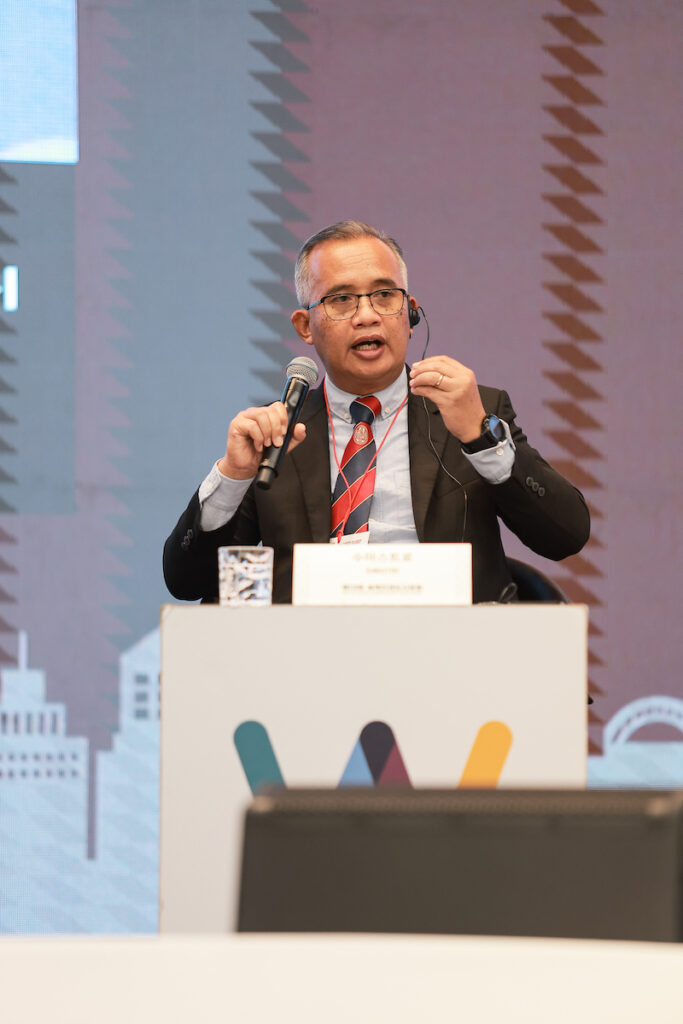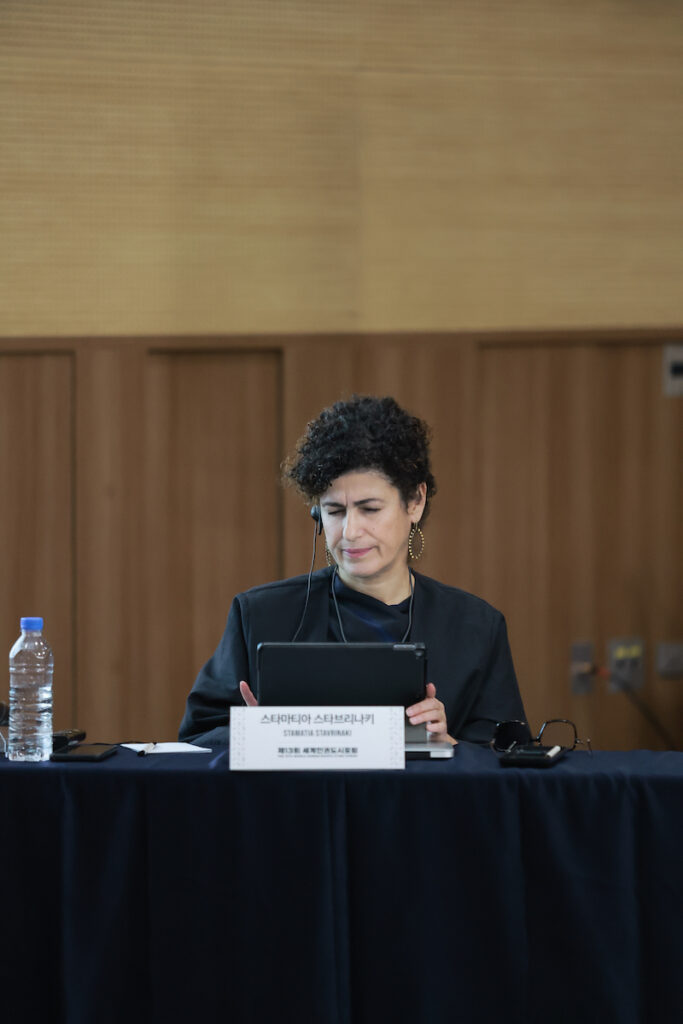The 13th World Human Rights Cities Forum: Interview with Key Speakers
Complied by the WHRCF Secretariat
The 13th World Human Rights Cities Forum was held from October 4–7, 2023, at the Kimdaejung Convention Center in Gwangju. Under this year’s theme, “Human Rights Cities Responding to Poverty and Inequalities,” a total of 32 programs were held, attracting more than 2,000 online and offline participants from 168 cities in 63 countries.
The Forum recognized that issues of poverty and inequality, which have been exacerbated since the Covid-19 pandemic’s outburst, go beyond mere economic issues and are serious violations of human rights that are not protected in the social, cultural, and political spheres, noting as well as that they are structural problems, rather than natural phenomena. These among other issues were discussed, and the agenda focused on in-depth ways to address them at the city level through a human rights-based approach.
World Human Rights Cities Forum Secretariat asked the Forum’s key speakers various questions on their thoughts about the relevance and importance of this year’s theme, the focus of their presentations, good practices, and their impressions of the Forum. We have selected a few of the interviews to share with Gwangju News readers. Below are parts of some of the interviews with the speakers, while the full versions of all interviews will be available on the World Human Rights Cities Forum website (www.whrcf.org) soon.
–
LOCAL GOVERNMENTS

Ms. Jaleswari Pramodhawardani
Deputy Chief of Staff, Executive Office of the President, Indonesia
Q1: Could you introduce Indonesia’s human rights policies implemented both by central and local governments?
A1: Indonesia’s human rights policies encompass various spectrums of human rights and descend directly from the mandate within the 1945 Constitution to inter alia promote and protect human rights. From a policy standpoint, at the central government level, just to name a few, in 2021, we launched our National Action Plan on Human Rights, which is a comprehensive guideline for all stakeholders, including regional governments, to mainstream human rights. Recently, we also launched our National Strategy on Business and Human Rights, which serves as a guideline for business entities and governments to heed human rights within business activities. While at the regional government level, countless vibrant and diverse initiatives consistently emerge. In Bali, for instance, the regional government-built community housing for vulnerable people serves as an empowerment hub for them to obtain productive training and skill upgrading and consequently advance the fulfillment of their economic, social, and cultural rights.
Q2: What was your motivation to participate in this year’s Forum?
A2: I am convinced that the WHRCF is a strategic forum to showcase Indonesia’s tireless commitment to promote and protect human rights. Conversely, the WHRCF also provides us with a unique opportunity to observe best practices from across the globe in promoting human rights, which could serve as a reference point when the government formulates human rights-related policies in the future.
Q3: Gwangju is anticipating the increase in cultural and economic interaction with Indonesia since the Indonesian delegation is regularly attending the World Human Rights Cities Forum. What are the specific measures that we can take?
A3: Mutual understanding is the key ingredient. I am certain that by replicating the success in the WHRCF through more exchange forums in other areas, we can establish more catalysts for both parts to interact with each other and eventually pave the way for more collaborations in the future.
–

Mr. Sumastro
Mayor, Singkawang, Indonesia
Q1: What was the most important message that you wished to convey during your intervention in the roundtable?
A1: For the session, I tried to give some ideas on how to look at tolerance in every situation. Tolerance is related to how we harmonize our lives within different backgrounds and different ethnicities. Based on my experience in my city, Singkawang, which has been named the most tolerant city in Indonesia four times over the past six years, if a city is tolerant, it is easy to attract tourism and investment. It is what helped my city to develop economic and social welfare in Singkawang.
Q2: What was your impression of visiting Gwangju for the Forum?
A2: It is my first time visiting Korea, and it is an honor to be here as a speaker. Also, it is an honor to have a conversation with majors from different countries. I think Gwangju Metropolitan City is a very beautiful, clean city, and everyone here is very nice. Also, it seems they respect each other, and also, of course, human rights.
–
INTERNATIONAL ORGANIZATIONS

Ms. Stamatia Stavrinaki
Vice Chairperson, UN Committee on the Elimination of Racial Discrimination
Q1: Could you let us know a bit about the importance and timeliness of the contents you have presented with regards to this year’s Forum theme?
A1: My presentation was about migrants’ rights to health in international human rights law. I think this is a very important aspect of the forum theme – inequalities. Migrants are exposed and are subject to many forms of discrimination due to their migratory status and other characteristics. They suffered human rights violations on many occasions, probably already in their home countries to begin with, and during the whole migrant cycle they took. They think that their life will be improved when they reach their destination country. However, sometimes, in practice, things are very different. First of all, they experience interpersonal bias and prejudice. It may even mean having lower standards of health services due to this interpersonal bias.
Also, they experience institutional racial discrimination because the laws and policies in the new country do not include migrants. They do not know their needs. They do not include them in how to provide better health care. There is also structural discrimination. The lack, for instance, information in their languages, resulting sometimes in very severe forms of discrimination and negative outcomes in their health. Inequalities in many cases lead to poverty, and also, poverty affects health as such. It is these multiple human rights violations that we need to consider seriously and combat as a human rights-based issue.
Q2: Do you have any advice for young people on how to act and what mindset to have to “respond to poverty and inequalities?”
A2: Young people should act by identifying inequalities, having awareness about the issue, and understanding that it is not the people’s fault when they become the subject of these inequalities – knowing that it is much more complex and structural. As this leads to many human rights violations, having and raising awareness of these inequalities in young people’s environment is important.
The first act is to inform people around you about why these inequalities exist and teach them how to identify them as well as how they also can change their mind about these issues.
Apart from raising awareness, discussing inequalities with your fellow students, your parents, your family, your friends, or anyone else and having access to data are important. Nowadays, young people have access to a lot of data online. However, it is important to distinguish between fake news and reliable news. This will help them to open their horizons and to change their minds about situations.
I think young people can also be the agents of change in their environments. Try not to be just a bystander but actively try to integrate those who might be suffering from inequalities within your group. Try to prevent any bias against them, and also actively try to change things at your level. You can actually speak up for them and also show practically that you accept them despite these inequalities. This combats bias and empowers these people. Most of all, it also empowers you because it shows that you are not just an observer of inequalities, but you have become one of the very active citizens fighting for a better future.
–

Ms. Garance Sarlat
Gender Associate Project Officer, UNESCO
Q1: Could you let us know how your presentation is related to this year’s Forum theme?
A1: With the Covid-19 pandemic, discrimination has increased dramatically, and we are suffering from the consequences of the pandemic. Why my presentation, I think, was related to the forum’s theme is because women’s poverty and the inequalities that women have to face are actually much more important due to the pandemic, where they were at the frontlines as healthcare workers. They were essential workers, having to do double or triple shifts while at home taking care of home-schooled children, taking care of sick relatives, and taking care of domestic work. The presentation I gave was on the importance of making sure that men and boys also did their fair share of the unpaid care work, which is one of the targets of SDG5 that we are not close to achieving, unfortunately. And so, it is something that we need to step up about.
This Forum was a fantastic opportunity to discuss those ways thanks to the work of local governments. We have discussed very different topics, like discrimination against sets of ethnicities, women, and persons with disabilities, and how we should address those. The concept that was discussed a lot and that is very important is the human rights-based economies that we need to create. This could sound weird, because how can you connect economies and the terrible impact that they have had on those vulnerable groups and human rights together, but this is something that we need to strive for, and that is why this Forum is so important.
Q2: Could you share what left the greatest impression on you during this year’s Forum, for example, the most impressive presentation or event?
A2: It is very difficult to pick one single moment from this fantastic forum, but what left the greatest impression on me were the presentations of the UNESCO Master Class Gwangju Series participants. Because those young people are in middle school, in junior high school, they arere very young – just 15 years old – and they delivered presentations that were incredibly professional, with research that you sometimes see at a master’s degree level. They were researching about inequalities, doing surveys with their peers and the elderly, and even met with the representatives of institutes and centers, and one team even went to a parliamentarian.
This is the work that we want to do. This is exactly what the UNESCO Master Classes were created for, and to see the result of those young people being empowered by the tools we gave them and actually taking it so much further beyond our hopes – this is so impressive. I was also very happy with the presentations – all of them were great. I mean, it is not as if just one was absolutely amazing – every single group delivered beautifully, and that is what touched me the most!







